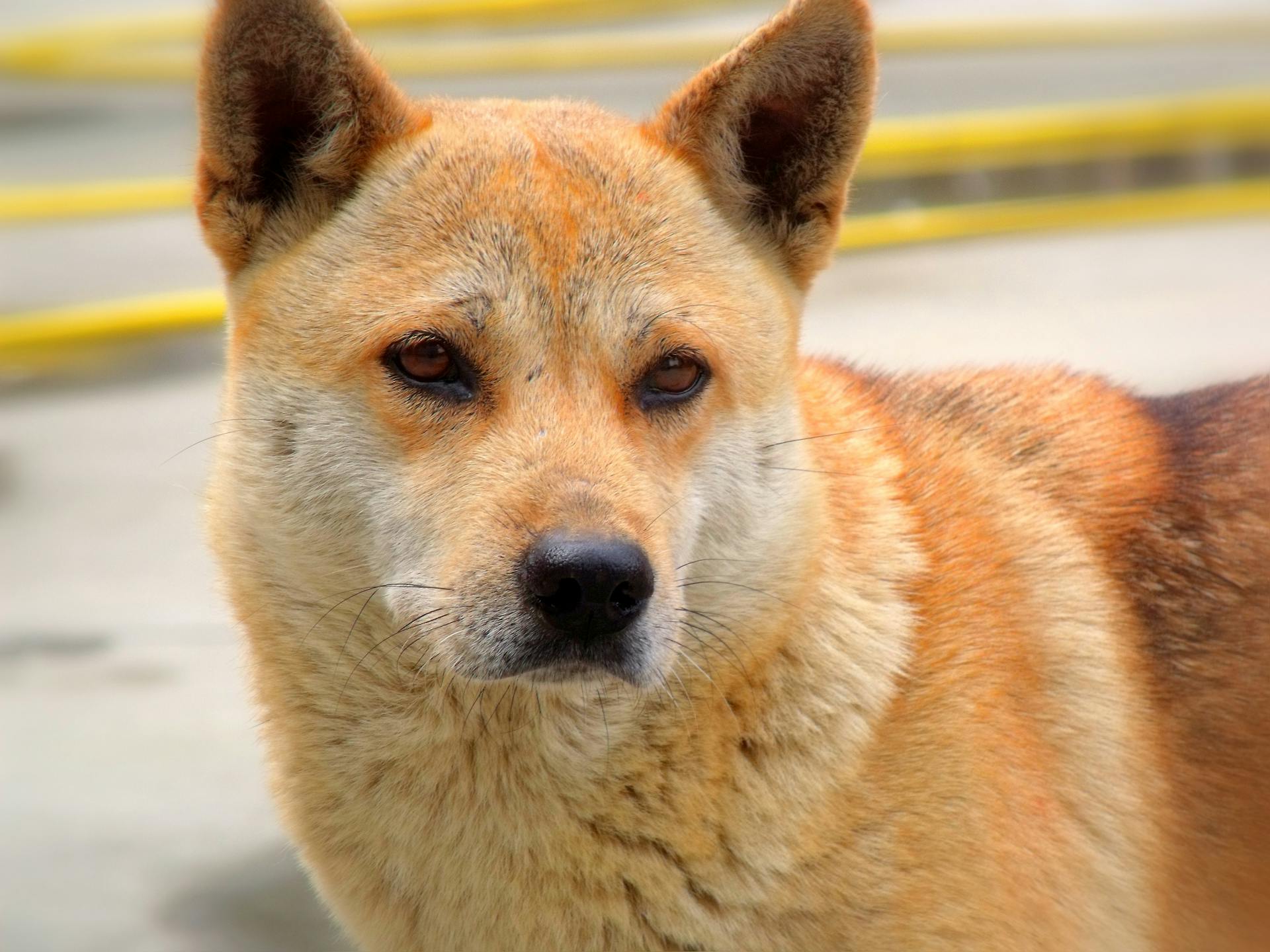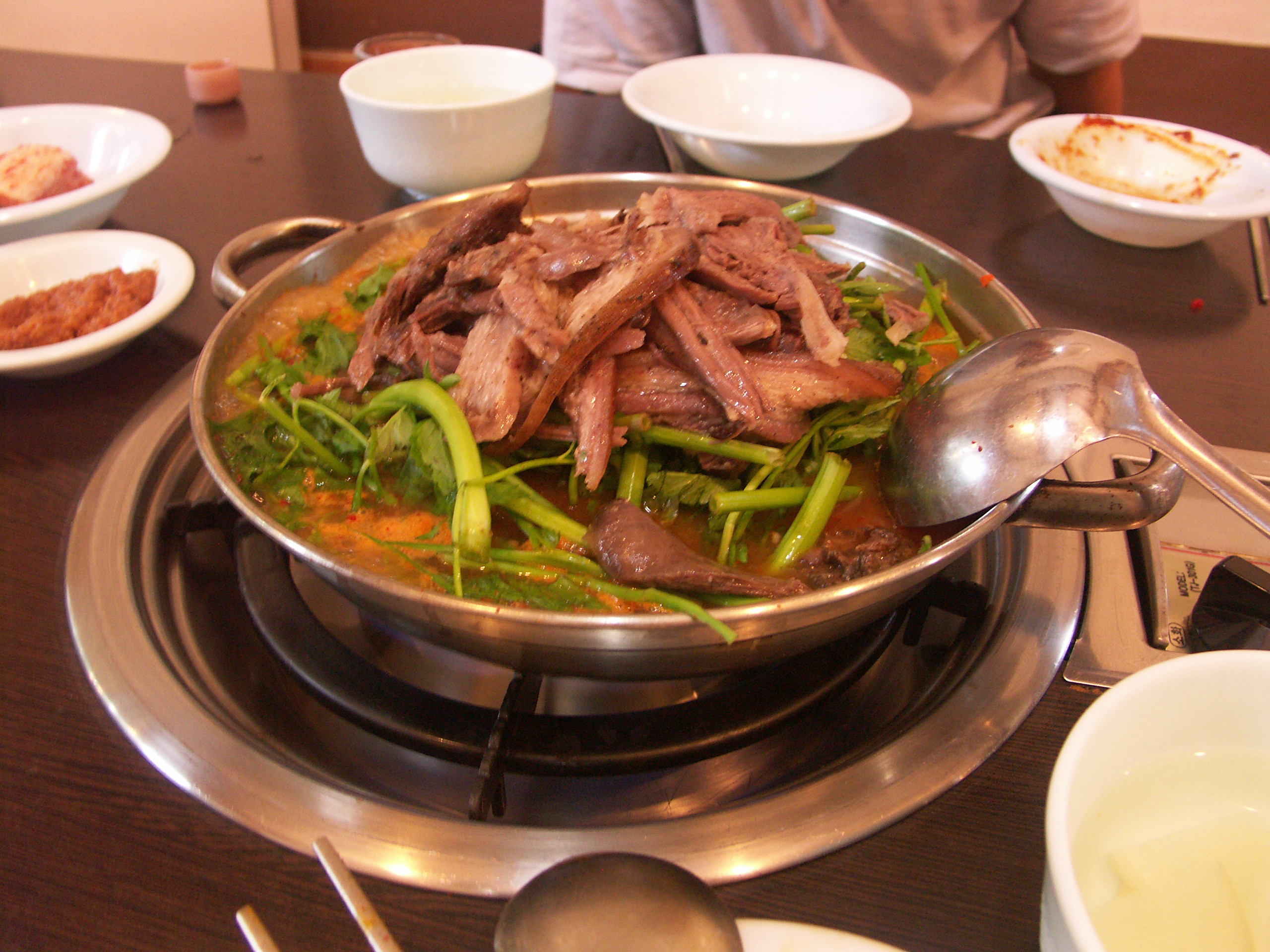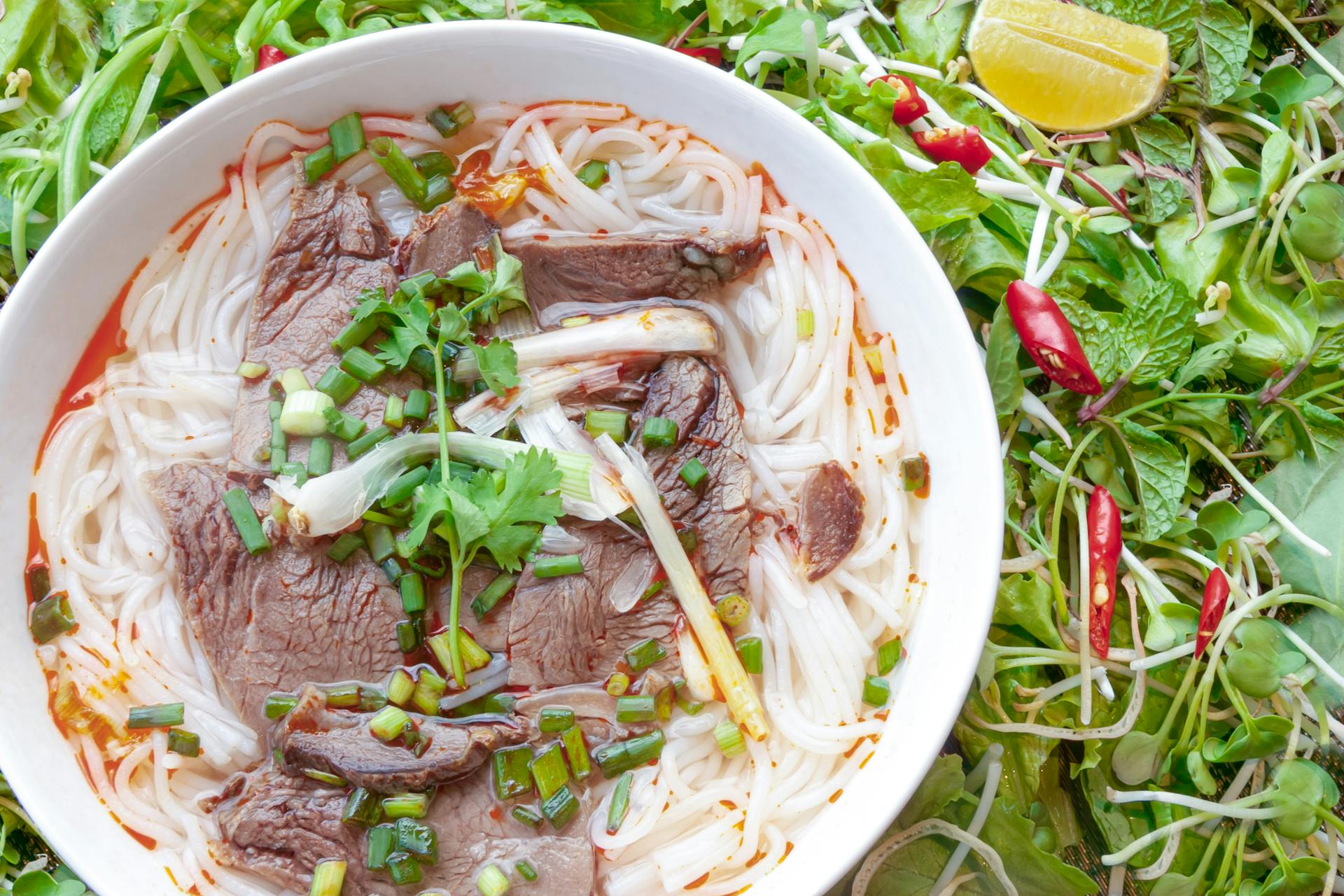
Dog meat consumption in South Korea is a complex issue with a rich history. The country has been known to consume dog meat for over 2,000 years.
South Koreans believe that dog meat has medicinal properties and can improve their health. The most popular dog meat dish is called "Boshintang", a soup made from dog meat and other ingredients.
The dog meat industry in South Korea is estimated to be worth around $2.3 billion annually. This industry is not regulated, allowing for inhumane treatment and slaughter of dogs.
Many South Koreans are now turning away from dog meat, with a survey showing that 70% of the population no longer consumes it.
Dog Meat Consumption in South Korea
Dog meat consumption in South Korea has seen a significant decline in recent years. Over 94% of respondents in a survey by Seoul think tank Animal Welfare Awareness, Research and Education said they hadn’t eaten dog meat in the past year.
This shift is largely due to increased awareness about the cruelty involved in the production of dog meat, including electrocution and hanging. The number of restaurants serving dog meat has also decreased, down 40% between 2005 and 2014.
A Gallup Korea poll from 2022 found that only 8% of South Koreans had eaten dog meat in the preceding year, a drop from 27% in 2015.
Dogs as Food
Dogs were consumed as a last resort during times of meat shortage in the early 20th century United States.
In the 19th century westward movement, mountainmen, Native Americans, the U.S. Army, and the Confederacy during the American Civil War would eat dog meat when other food sources were scarce.
The first animals to be consumed during these times were typically horses, followed by mules, and then dogs.
The Farmer's Perspective
Dog farmers in South Korea are facing a significant change with the impending ban on dog meat consumption.
Since 2014, some municipalities have compensated dog meat retailers for closing their stalls, but now farmers are requesting similar schemes as the ban will directly affect their livelihoods.
The Korean Dog Meat Association has been arguing that the bill represents an abuse of power and overlooks the perspective of many South Koreans.
Dog meat farmers are demanding compensation of 2 million won per individual dog, which is about £1,200, and a 10-year grace period after the ban.
This request is not just about financial compensation but also about recognizing the impact of the ban on their profession, which has been practiced for generations.
Global Comparison
In South Korea, dog meat consumption is a highly debated and complex issue. The country's dog meat industry is estimated to be worth around $1.4 billion annually.
South Korea is not the only country where dog meat is consumed, but it is one of the largest markets. According to a survey, 44% of South Koreans have eaten dog meat at least once.
In contrast, many Western countries, including the US, UK, and Australia, have banned dog meat consumption.
Here's an interesting read: Korea Bans Eating Dogs
Hong Kong

Hong Kong has a law that prohibits the slaughter of dogs and cats for food, dating back to 1950 when the Dogs and Cats Ordinance was introduced.
In Hong Kong, the penalty for violating this law can be quite severe, as seen in the case of a Hong Konger who was sentenced to one month in prison and a fine of two thousand HK dollars in 1998.
Four local men were sentenced to 30 days in prison in 2006 for slaughtering two dogs, showing that the law is enforced.
This law demonstrates a commitment to animal welfare in Hong Kong, a city with a unique cultural and historical context.
Taiwan
Taiwan has made significant strides in protecting animal welfare, with a ban on the sale of dog meat imposed in 2001 due to domestic pressure and a desire to improve international perceptions.
The Taiwanese government increased fines for selling dog meat in 2007, but animal rights activists claim the government hasn't done enough to prosecute those who continue to slaughter and serve dog meat.

Despite the laws, dog meat remained popular in Taiwan, especially in smaller towns and villages, according to The Daily Meal in 2014.
In a major breakthrough, Taiwan became the first country in East Asia to officially ban the consumption of dog and cat meat in April 2017.
The Animal Protection Act amendments approved by the Legislative Yuan introduced stiff penalties, including fines ranging from NT$50,000 to NT$2 million for selling or consuming dog or cat meat.
The amendments also increased punishments for animal cruelty, with a maximum two years' imprisonment and fines of NT$200,000 to NT$2 million for those who intentionally harm animals.
In October 2017, Taiwan's Legislative Yuan passed further amendments to the Animal Protection Act, banning the sale and consumption of dog and cat meat and any food products containing their meat or parts.
A unique perspective: Dog Names for 2 Dogs
Stigmatisation and Reactions
The stigmatisation of dog meat consumption in South Korea is a complex issue. It was temporarily banned in traditional markets before the 1988 Seoul Olympic Games to avoid offending foreigners, but this decision was widely criticised by part of South Korean civil society.
This incident sparked feelings of national pride and protection towards the consumption of dog meat, with influential public and political figures taking a public stance in favour of it as a national cultural symbol. The government's decision was seen as a form of cultural imperialism reminiscent of colonial times.
The ban was re-introduced before the 2018 Winter Olympics in Pyeongchang, with the government asking dog meat retailers to hide their signs and dog carcasses. The South Korean government's attempts to ban dog meat have been met with protests and concerns about the livelihoods of farmers and restaurant owners.
The government is addressing occupational fears with compensation packages to help businesses move out of the industry, which is a significant step forward.
Stigmatisation
The stigmatisation of dog meat consumption in South Korea is a complex issue. It's been a contentious topic for decades, with different groups holding strong opinions on the matter.
The South Korean government has attempted to address this issue, but progress has been halted due to protests and concerns about the livelihoods of farmers and restaurant owners. In the run-up to the 1988 Seoul Olympic Games, the government temporarily banned the sale of dog meat in traditional markets to avoid offending foreigners.
This decision sparked controversy, with some South Korean civil society members viewing it as a form of cultural imperialism reminiscent of colonial times. They saw it as an erasure of Korean cultural traditions.
During the 2002 Fifa World Cup, influential South Korean public and political figures took a public stance in favour of dog meat as a national cultural symbol. This move reignited tensions and solidified the issue's place in South Korean culture.
The government's efforts to address the issue have been met with resistance, but recent developments suggest a shift in public opinion. A survey by Animal Welfare Awareness, Research and Education found that over 94% of respondents hadn't eaten dog meat in the past year, and 93% didn't intend to do so in the future.
See what others are reading: South Korean Dog Meat Farm Rescue
Fell Out of Favour in South Korea
Dog meat consumption in South Korea has fallen dramatically, a result of increased pet adoption and awareness about the cruelty involved in its production.

Over 94% of respondents in a recent survey said they hadn’t eaten dog meat in the past year, with 93% not intending to do so in the future.
The number of restaurants serving dog meat decreased by 40% between 2005 and 2014 due to declining demand.
All of South Korea's major dog meat markets have shut down.
Only 8% of South Koreans had eaten dog meat in the preceding year, according to a Gallup Korea poll from 2022, down from 27% in 2015.
A staggering 64% of respondents were against the consumption of dog meat, highlighting the shift in public opinion.
South Korea's Ban Efforts
South Korea's Ban Efforts have been a long time coming, but they're finally gaining momentum. Over 94% of respondents in a recent survey said they hadn't eaten dog meat in the past year, and about 93% don't intend to do so in the future.
The government is taking steps to address concerns about the livelihoods of farmers and restaurant owners, with compensation packages to help businesses move out of the industry. The agriculture ministry has confirmed it will consult with businesses to ensure they can operate in a stable manner.
The proposed ban has been met with resistance from the Dog Meat Federation, which threatened to release two million dogs outside the president's office. However, the government's efforts to provide financial support and compensation packages may help alleviate some of the concerns.
A Gallup Korea poll from 2022 revealed that only 8% of South Koreans had eaten dog meat in the preceding year, a drop from 27% in 2015. This shift in public opinion has been driven by increased awareness about the cruelty involved in the production of dog meat.
The Korean Association of Edible Dogs is seeking at least two million won ($1,520) per dog over the next five years, on top of the expenses for facilities that will become defunct. This would equate to a compensation sum of $2.28B.
Frequently Asked Questions
How many dogs are slaughtered in Korea?
According to activists, approximately 1 million dogs are slaughtered in Korea each year, with a significant portion being sold in restaurants.
Sources
- https://en.wikipedia.org/wiki/Dog_meat
- https://theconversation.com/why-south-korea-is-banning-the-sale-of-dog-meat-220926
- https://www.aljazeera.com/gallery/2023/7/31/south-korean-dog-meat-farmers-face-growing-push-to-ban-industry
- https://awionline.org/awi-quarterly/2012-winter/friend-or-food-south-koreas-cruel-dog-meat-trade
- https://www.greenqueen.com.hk/dog-meat-in-south-korea-ban/
Featured Images: pexels.com

